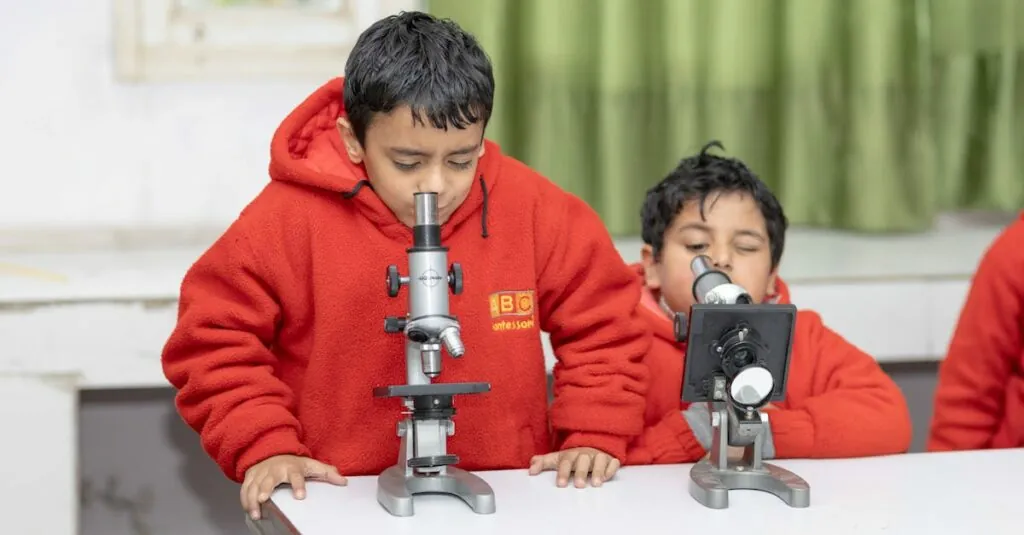Table of Contents
ToggleWhen it comes to autism, parents often find themselves navigating a complex maze of therapies and treatments. Enter stem cells, the superheroes of the medical world, promising potential breakthroughs that could change the lives of autistic kids. Imagine a world where these tiny cells could help unlock communication barriers and foster social connections. Sounds like science fiction? It’s closer to reality than you might think.
As researchers dive deeper into the possibilities of stem cell therapy, hope is blossoming for families seeking new avenues of support. While the journey is filled with questions and uncertainties, the potential benefits offer a glimmer of optimism. Buckle up as we explore the fascinating world of stem cells and their role in autism treatment—because who wouldn’t want to be a part of this exciting adventure?
Overview of Stem Cells for Autistic Kids
Stem cell therapy shows promise as a potential intervention for children with autism. Research indicates that these cells might address underlying biological issues related to autism’s symptoms. By considering regenerative properties, scientists aim to explore how stem cells could improve brain function, potentially enhancing communication and social skills.
Types of stem cells used in research include embryonic stem cells, induced pluripotent stem cells, and mesenchymal stem cells. Each type presents unique benefits and challenges in application. For instance, embryonic stem cells possess the ability to develop into any cell type in the body, creating vast possibilities for treatment.
Clinical trials continue to advance understanding of stem cell therapy’s efficacy in autism. Initial studies report varying degrees of success, with some children experiencing improved social engagement and reduced behavioral issues. Data from a 2021 study indicated that 23% of participants showed significant improvement after treatment, while others reported mild enhancements.
Experts emphasize the need for further research. They highlight the importance of assessing long-term effects and safety. Regulatory bodies monitor these studies closely to ensure ethical practices in stem cell administration, protecting the well-being of young participants.
Parents exploring this treatment option often look for credible information. Numerous research institutions are key players in advancing stem cell therapy initiatives, providing updates on trials and findings. As discoveries emerge, continued dialogue in the medical community engages families seeking innovative support for autism.
Types of Stem Cells Used
Stem cell therapy involves various stem cell types, each with unique properties. Researchers focus on the regenerative capabilities of these cells to address autism symptoms.
Embryonic Stem Cells
Embryonic stem cells, derived from early-stage embryos, exhibit the ability to develop into any cell type in the body. These cells show promise in repairing damaged tissues and potentially enhancing neural connections. Their pluripotency offers a significant advantage in treating autism, as they can differentiate into neurons and glial cells. However, ethical concerns surround the use of embryonic stem cells, prompting debate about their application in clinical settings. Rigorous regulations govern their use, ensuring ethical standards are met.
Adult Stem Cells
Adult stem cells, found in mature tissues, serve to replenish damaged cells within specific organs. They possess limited differentiation potential compared to embryonic stem cells, which may restrict their application in treating autism. Mesenchymal stem cells, a type of adult stem cell, exhibit immunomodulatory properties and the ability to support neural regeneration. Studies indicate these cells may lead to improvements in social and communication skills among autistic children. Ongoing research continues to explore the effectiveness and safety of adult stem cells, aiming to provide viable treatment options.
Research and Clinical Trials
Stem cell therapy represents a burgeoning field in autism research, with numerous ongoing studies exploring its efficacy. Research focuses on various types of stem cells, including embryonic and mesenchymal, and their potential to address autism’s complex symptoms.
Current Studies
Numerous clinical trials are currently underway. Several explore the effectiveness of mesenchymal stem cells in improving behavioral symptoms. A recent study found that 23% of autistic children showed significant progress in communication and social skills after receiving treatment. Investigators continue to assess both short-term and long-term effects, ensuring rigorous protocols are followed throughout these trials. Collaborations between research institutions and healthcare facilities enhance the quality and scope of these studies.
Potential Benefits
Stem cell therapy may offer several benefits for autistic children. Improvements in neural connections can lead to enhanced communication abilities. Therapies that utilize mesenchymal stem cells may also possess immunomodulatory properties, potentially reducing inflammation associated with autism. Beyond immediate behavioral improvements, long-term benefits could involve better emotional regulation and social interaction. Families are hopeful as scientific advances bring new possibilities for effective treatments in autism spectrum disorder.
Ethical Considerations
Ethics plays a crucial role in the discussion surrounding stem cell therapy for autistic children. Concerns about the source of stem cells often arise, especially with embryonic stem cells derived from early-stage embryos. Such use raises significant moral questions about the potential destruction of embryos and the implications of life creation. Regulations governing these practices remain stringent to address these concerns.
Adult stem cells, on the other hand, present a more ethically acceptable alternative. These cells, sourced from mature tissues, offer promising therapeutic benefits without the associated ethical dilemmas tied to embryonic cells. Research often emphasizes the potential of mesenchymal stem cells due to their ability to affect immune responses and enhance neural functions. This aspect makes them appealing for autism treatment.
Parents and researchers frequently navigate complex ethical landscapes when considering clinical trials involving stem cell therapies. Informed consent stands as a pivotal requirement in such studies, ensuring families fully understand the risks and benefits of participation. Transparency in research processes helps build trust among participants and fosters ethical standards in treatment protocols.
Community perspectives significantly influence acceptance and implementation of stem cell therapies. Cultural beliefs and values shape views on medical interventions, impacting how families assess the viability of stem cell treatments. Ongoing public discourse is essential for addressing ethical concerns, contributing to broader understanding and acceptance.
Overall, ethical considerations remain integral to the development and application of stem cell therapies in autism treatment. Scientists, practitioners, and families must collaboratively engage in dialogue to ensure ethical practices align with the hopeful prospects these therapies may provide.
Challenges and Limitations
Research on stem cell therapy for autistic children faces several challenges. Ethical concerns often arise, particularly regarding the use of embryonic stem cells. Regulations governing their use add complexity to research efforts. Limited differentiation potential in adult stem cells presents another hurdle. While mesenchymal stem cells show promise, their effectiveness varies among individuals.
Clinical trials encounter obstacles related to funding and resources. High costs associated with these trials may restrict participation. Informed consent continues to be a critical component, ensuring families fully understand risks and benefits. Recruitment of participants often proves difficult, impacting the ability to gather substantial data.
Additionally, the scientific community remains cautious regarding the long-term effects of stem cell therapy. Some studies indicate that 23% of autistic children experience significant improvements, yet more data is necessary. Rigorous protocols need to be established to assess both short-term and long-term outcomes reliably.
Public perception also impacts the acceptance of stem cell therapies. Cultural beliefs and community perspectives play influential roles in the willingness to embrace new treatments. Continued education about the potential benefits and risks of stem cell therapy is essential for fostering understanding.
Overall, addressing these challenges requires collaboration among researchers, practitioners, and families. Ongoing dialogue will support the development of ethical and effective pathways for stem cell therapies in autism treatment.
The exploration of stem cell therapy for autistic children represents a beacon of hope for many families. As research progresses and clinical trials yield promising results, the potential for improved communication and social skills becomes increasingly tangible.
While ethical considerations and research challenges remain, the scientific community’s dedication to finding effective treatments is evident. Families are encouraged to stay informed and engaged in discussions surrounding these advancements.
Ultimately, the journey towards understanding and utilizing stem cell therapies could transform the landscape of autism treatment, offering new avenues for support and connection.








